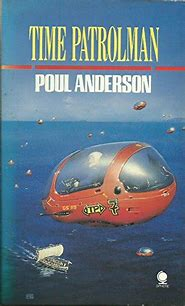The descriptions of Tyre remind us that Poul Anderson also wrote straight historical fiction. The descriptions of seafaring merchant adventurers remind us that he also wrote about spacefaring merchant adventurers. The presence of time travel makes this narrative historical sf and therefore reminds us that Anderson also wrote historical fantasies. Indeed, Everard's local assistant, Pummairam, is not yet equipped to tell the difference:
"'I think,' said Pum, 'my lord intends to do battle, in a strange realm where wizards are his foes.'
"Am I that transparent to him?" (p. 320)
One passage summarizes history and two kinds of sf:
"...his shipmates, his friends - they died and their kin mourned them, as would be the fate of seafarers for the next several thousand years...and afterward spacefarers, timefarers...." (p. 325)
- although, of course, timefarers are now back among the earliest seafarers.
The real hero of this story is Pum, intelligent enough to realize that Everard is his way out of his former life. The story concludes:
"Pum was gone. Feet flying, kaftan flapping, the purple wharf rat sped to the destiny he would make for himself." (p. 331)
As with Leon Ammon - a very different character - in the Technic History, we would like to see Pum at a later stage of his rise and rise.

1 comment:
Pum isn't merely intelligent; his unusual life has made him more mentally flexible than most, able to grasp concepts that would just bewilder most of his contemporaries.
That's what makes him a great prize for the Patrol -- after the Academy, he can be a better agent in place in the ancient Near East than anyone like the 20th-century Israeli agents Everard meets could.
Post a Comment